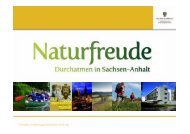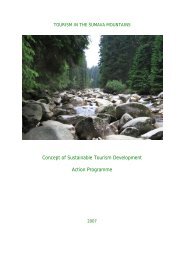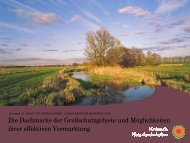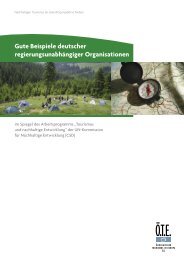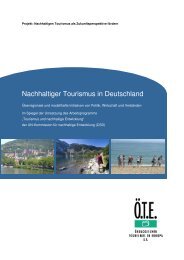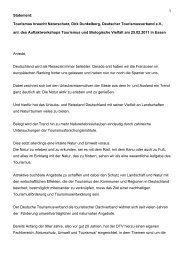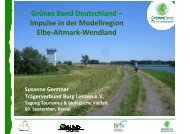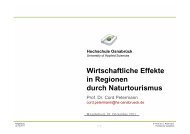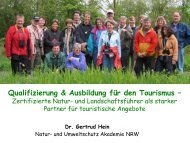Gute Beispiele aus der deutschen Tourismuswirtschaft und den ...
Gute Beispiele aus der deutschen Tourismuswirtschaft und den ...
Gute Beispiele aus der deutschen Tourismuswirtschaft und den ...
Erfolgreiche ePaper selbst erstellen
Machen Sie aus Ihren PDF Publikationen ein blätterbares Flipbook mit unserer einzigartigen Google optimierten e-Paper Software.
and organizations, and taking note of the Programme of Action for the<br />
Sustainable Development of Small Island Developing States, 16 adopted at<br />
Barbados in 1994, to consi<strong>der</strong> un<strong>der</strong>taking the following initiatives and to<br />
keep the Commission on Sustainable Development informed on progress<br />
achieved:<br />
(a) To promote sustainable tourism development in or<strong>der</strong> to<br />
increase the benefits from the tourism resources for the population in the<br />
host communities and maintain the cultural and environmental integrity<br />
of the host community; to encourage cooperation of major groups at all<br />
levels with a view to facilitating Local Agenda 21 initiatives and promoting<br />
linkages within the local economy in or<strong>der</strong> that benefits may be more<br />
widely shared; to this end, greater efforts should be un<strong>der</strong>taken for the<br />
employment of the local workforce, and the use of local products and<br />
skills;<br />
(b) To support national efforts by countries, especially developing<br />
countries and countries with economies in transition, and major groups<br />
towards sustainable tourism development through relevant capacitybuilding<br />
activities and programmes as well as multilateral and bilateral<br />
financial and technical assistance, and appropriate technologies in all<br />
aspects of sustainable tourism development, including environmental impact<br />
assessment and management and education in the field of tourism;<br />
(c) To encourage more responsible behaviour among tourists<br />
through ensuring respect for national laws, cultural values, social norms<br />
and tradition as well as by increasing public awareness, in addition to<br />
other measures;<br />
(d) To promote the application of integrated planning approaches<br />
to tourism development at the local level, including through encouraging<br />
the use of Local Agenda 21 as a process for planning, implementing<br />
and monitoring sustainable tourism development and recognizing the<br />
potential for integration of Local Agenda 21 with Agenda 21 for the Travel<br />
and Tourism Industry as well as other such initiatives;<br />
(e) To provide relevant direction on research activities, and collect<br />
and disseminate information on best practices and techniques, including<br />
an appropriate mix of instruments to minimize negative and to promote<br />
positive environmental, social and cultural impacts from tourism in<br />
developed and developing countries and in countries with economies in<br />
transition;<br />
(f) To promote the exchange of information on transportation,<br />
accommodation and other services, public awareness-raising programmes<br />
and education, and various voluntary initiatives and ways to minimize the<br />
effects of natural disasters on tourism. Possible forms of this information<br />
exchange should be explored in consultation with relevant partners, utilizing,<br />
inter alia, such means as bilateral and multilateral arrangements;<br />
(g) To un<strong>der</strong>take studies on appropriate measures for promoting<br />
sustainable tourism development, such as community planning in fragile<br />
ecosystems, including in coastal areas, and to develop tools to assist local<br />
authorities in determining appropriate management regimes and their<br />
capacity for tourism development;<br />
(h) To further develop or support integrated initiatives, preferably<br />
through pilot projects, to enhance the diffusion of innovations and to<br />
avoid, wherever possible, duplication and waste of resources;<br />
(i) To un<strong>der</strong>take activities that would be supportive of the preparations<br />
for both the International Year of Ecotourism and the International<br />
Year of Mountains, as well as activities of the International Coral Reef<br />
Initiative;<br />
(j) To clarify further the concepts of sustainable tourism and ecotourism;<br />
(k) To develop core indicators for sustainable tourism development,<br />
taking into account the work of the World Tourism Organization<br />
and other relevant organizations, as well as the ongoing testing phase of<br />
indicators for sustainable development;<br />
(l) To un<strong>der</strong>take a comprehensive survey and assessment of the<br />
results of implementing existing voluntary initiatives and guidelines relating<br />
to the economic, sociocultural and environmental sustainability of<br />
tourism, to be reported to the Commission on Sustainable Development<br />
in or<strong>der</strong> to i<strong>den</strong>tify best practices with respect to raising awareness of<br />
sustainable tourism development;<br />
(m) To consi<strong>der</strong> establishing a global network, taking into account<br />
the work of the World Tourism Organization, regional mechanisms and all<br />
major groups, as appropriate, to promote an exchange of information and<br />
views on sustainable tourism development, including on ecotourism;<br />
(n) To cooperate with the United Nations Environment Programme<br />
in further developing guiding principles for sustainable tourism<br />
development;<br />
(o) To encourage business and industry to take steps to implement<br />
eco-efficiency approaches, in or<strong>der</strong> to reduce environmental impacts<br />
associated with travel and tourism activities, in particular the volume of<br />
packaging waste, especially in small island developing States.<br />
6. The Commission invites the World Tourism Organization to<br />
consi<strong>der</strong> informed major groups’ participation, as appropriate, in the development,<br />
implementation and monitoring of its Global Code of Ethics<br />
for Tourism, including those provisions relating to a code of conduct for<br />
tourists.<br />
7. The Commission invites relevant agencies, particularly the<br />
International Maritime Organization, to evaluate whether existing regulations<br />
on marine pollution and compliance with them are sufficient to provide<br />
adequate protection to fragile coastal zones from adverse impacts as<br />
a result of tourist vessel activities.<br />
8. The Commission invites the Conference of the Parties to the<br />
Convention on Biological Diversity to further consi<strong>der</strong>, in the context of<br />
the process of the exchange of experiences, existing knowledge and best<br />
practice on sustainable tourism development and biological diversity with<br />
a view to contributing to international guidelines for activities related<br />
to sustainable tourism development in vulnerable terrestrial, marine and<br />
coastal ecosystems and habitats of major importance for biological diversity<br />
and protected areas, including fragile mountain ecosystems.<br />
9. The Commission welcomes the work of major groups, especially<br />
the business community, trade and tourism industry associations,<br />
non-governmental organizations and other groups involved in travel and<br />
tourism, to contribute to efforts to achieve sustainable tourism development,<br />
including through educational initiatives and action plans based<br />
on Agenda 21 and other related documents, and particularly welcomes<br />
their commitment through the continuation of their work with all major<br />
groups, to do more, and to report to the Commission on Sustainable<br />
Development on their progress.<br />
10. The Commission invites the United Nations Secretariat and the<br />
World Tourism Organization, in consultation with major groups and other<br />
relevant international organizations, to jointly facilitate the establishment<br />
of an ad hoc informal open-ended working group on tourism to assess<br />
financial leakages and determine how to maximize benefits for indigenous<br />
and local communities; and to prepare a joint initiative to improve information<br />
availability and capacity-building for participation, and address<br />
other matters relevant to the implementation of the international work<br />
programme on sustainable tourism development.<br />
Anmerkung: Es gibt zu <strong>der</strong> o.g. “Commission on Sustainable Development,<br />
7th session” keine autorisierte deutsche Übersetzung. Daher konnte an<br />
dieser Stelle nur die Originalfassung veröffentlicht wer<strong>den</strong>.<br />
16 Report of the Global Coference on the Sustainable Development of Small Island Developing States, Bridgetown, Barbados, 25 April - 6 May 1994<br />
(United Nations publication, Sales No. E.94.I.18 and corrigenda), chap I, resolution 1, annex II.<br />
57




